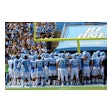A study released today by Sports Illustrated and CBS News has found that criminal records among major college football players are more common than many people might think - including the coaches recruiting those players.
Of the 2,837 players represented on the rosters of SI's 2010 preseason Top 25 teams, seven percent had been in trouble with the law. More than 200 players had either been arrested or formally cited by police. Thirty-nine percent of those who'd been arrested had been charged with serious crimes such as assault and battery, domestic violence, burglary, cocaine possession or DUI.
Richard Lapchick, director of the Institute for Diversity and Ethics in Sports at the University of Central Florida, told CBS News, "I think, as a general population, these are going to be stunning statistics to try to absorb, and policy changes will hopefully come about as a result."
Six reporters compiled the statistics after six months of exhaustive player background checks. They found that only two schools on the list of 25 - Texas Christian University and the University of Oklahoma - conduct their own background checks on new recruits. However, even those schools don't check juvenile records, despite the fact most recruits are juveniles at the time they sign letters of intent. "The simplest way for a coach to learn a recruit's juvenile history is to ask him for it," wrote Jeff Benedict in a background essay to the SI cover story he co-authored with Armen Keteyian of CBS News. "That doesn't seem unreasonable before handing over a four-year scholarship worth well over $100,000."
Banning players with an arrest history is not the answer, added Benedict, former research director for Northeastern University's Center for the Study of Sport in Society and author of four books on athletes and crime. He then suggested the following measures:• Require all recruits to sign a waiver authorizing schools to have access to their juvenile criminal history. Many colleges already require applicants to sign a form that states they have never been convicted of a felony. Certainly it's not too much to ask those being awarded a scholarship to disclose any juvenile arrests, particularly those involving violence, weapons or drugs.• The NCAA should push for an across-the-board adoption of such a policy, averting the possibility that those schools who take this approach aren't disadvantaged by those who avoid it.• The screening process for recruits should be expanded beyond coaches. When a criminal history is discovered on a recruit, that information should be shared with at least one other individual - preferably someone outside the athletic department - for review. Schools make a big investment in football recruits and should be part of the decision-making process when a player's prior history poses a risk.
Appearing this morning on CBS's "The Early Show," Keteyian stated, "Mark Emmert, the new president of the NCAA, has already been alerted to this and has called it 'completely unacceptable.' I would venture to guess there's going to be some changes coming very soon."

































